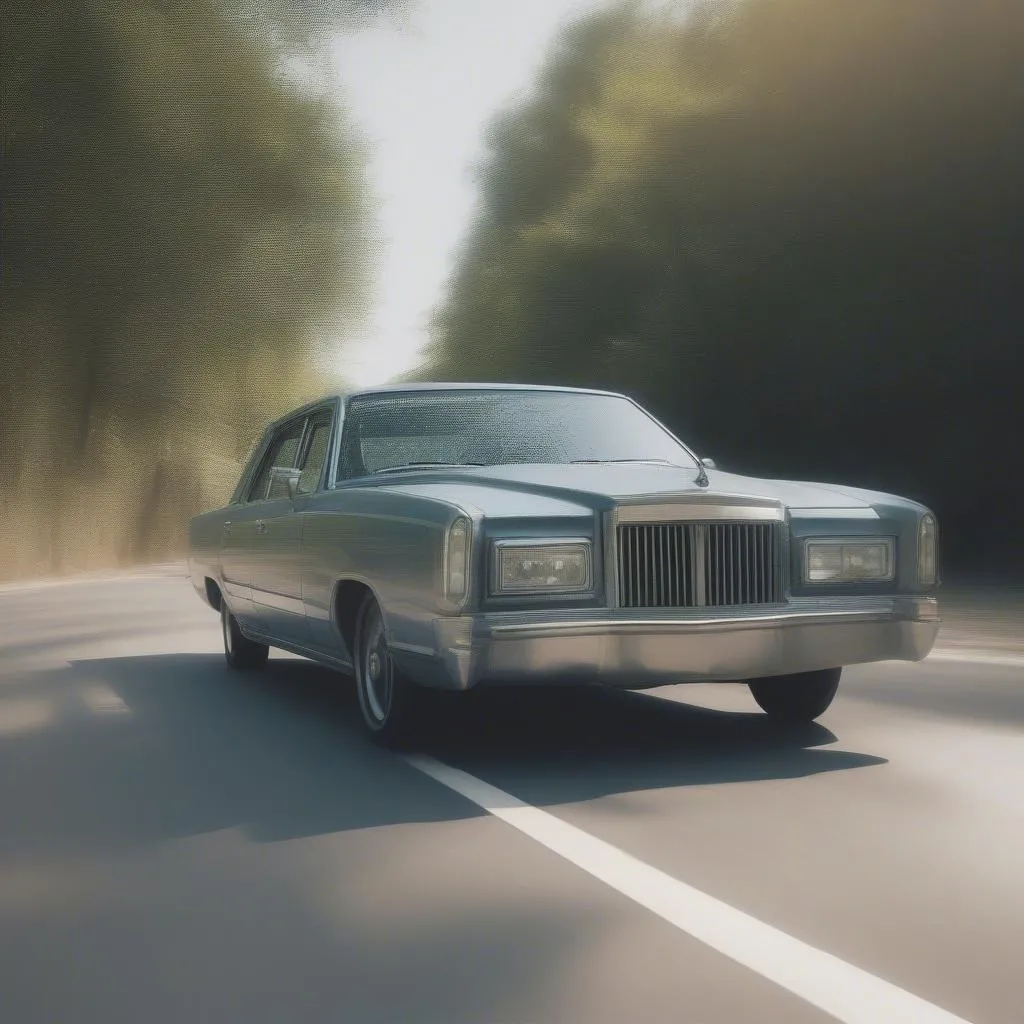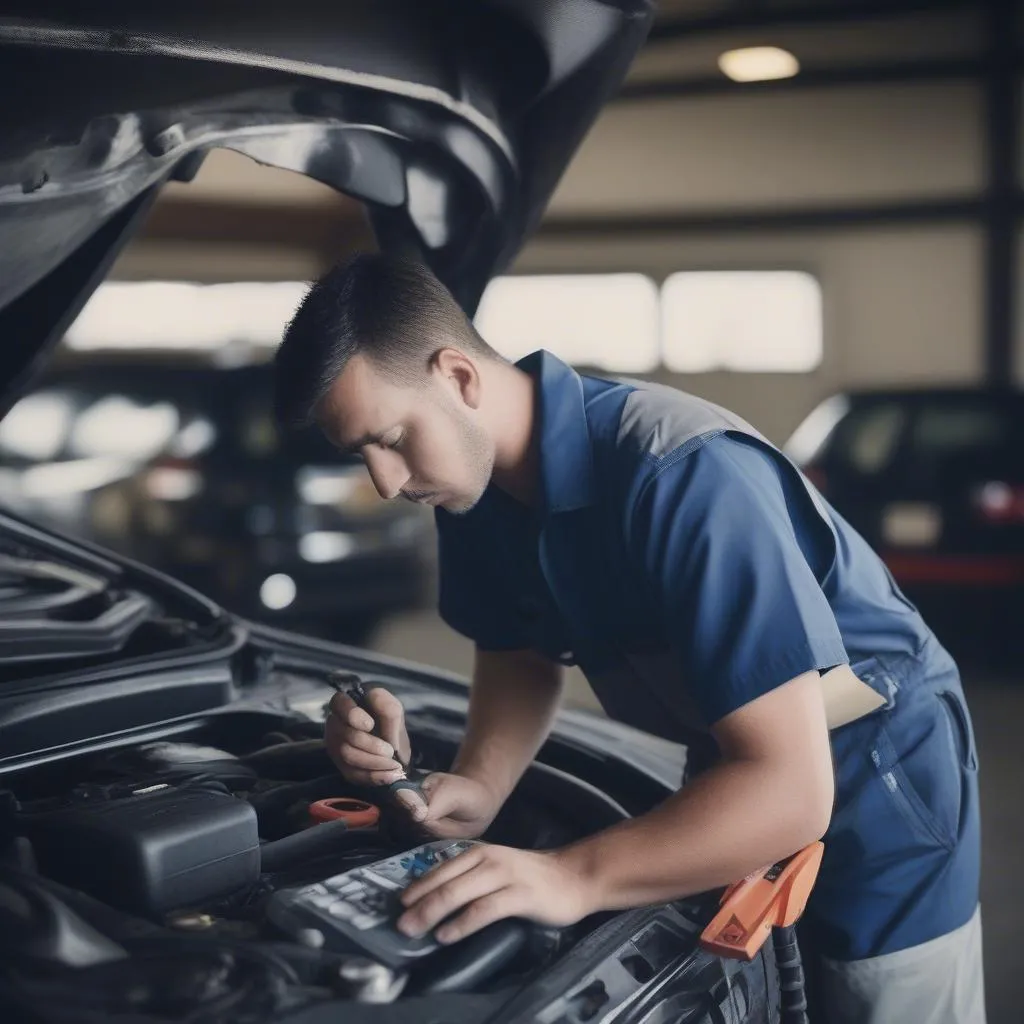Imagine you’re cruising down a quiet residential street, enjoying the peaceful drive. Suddenly, your car starts to vibrate, especially when you’re driving slow. It feels like your car is shaking, rattling, or shuddering, making for an uncomfortable and potentially concerning experience. You might be wondering, “What’s going on with my car?”
This is a common problem, and there are a number of potential causes. This article will delve into the reasons why your car might be vibrating at low speeds and guide you through potential solutions.
Why Your Car Might Vibrate When Driving Slow
Understanding the Problem
A car’s vibration at slow speeds is often a symptom of a more significant issue. A variety of factors can contribute to this problem. From a technical standpoint, the vibrations you feel are caused by uneven rotation or a disturbance in the car’s drivetrain, wheels, or suspension system.
Potential Causes and Solutions:
Here’s a breakdown of the most common causes of a car vibrating when driving slow, along with possible solutions:
1. Unbalanced or Damaged Wheels:
Unbalanced wheels are a very common culprit behind car vibrations. When the weight distribution in a wheel isn’t balanced, it can cause uneven rotation, leading to vibrations. This issue is often noticeable at low speeds.
- Solution: Take your car to a trusted mechanic to have your wheels balanced. This process involves adding or removing weight to the rim to achieve even distribution.
2. Worn Wheel Bearings:
Wheel bearings support the weight of the car and allow the wheels to rotate smoothly. Over time, they can wear down, leading to vibrations.
- Solution: Inspect the wheel bearings for wear and tear, and replace them if necessary.
3. Damaged CV Joints:
CV joints are part of the drivetrain, connecting the wheels to the transmission. Damaged CV joints can cause vibrations, especially when turning.
- Solution: Have your CV joints inspected by a mechanic. If they’re worn or damaged, they need to be replaced.
4. Engine Misfires:
Engine misfires occur when the engine doesn’t burn fuel efficiently, causing a shaky or rough idle.
- Solution: Diagnose the misfire using an OBD-II scanner and address the underlying issue. Possible causes include faulty spark plugs, ignition coils, or fuel injectors.
5. Suspension Problems:
Worn suspension components, including shocks, struts, and control arm bushings, can contribute to vibrations.
- Solution: Have your suspension system inspected and repaired as needed.
6. Bent or Damaged Brake Rotors:
If you’ve been in a minor accident, or hit a curb, it’s possible your brake rotors are damaged. This can lead to vibrations when braking.
- Solution: If your brake rotors are damaged, they will need to be replaced or resurfaced.
7. Engine Mounts:
Engine mounts are designed to absorb vibrations from the engine. Worn engine mounts can allow the engine to shake, causing vibrations in the cabin.
- Solution: Replace worn engine mounts to reduce vibrations.
8. Loose or Worn Transmission Mounts:
Transmission mounts play a vital role in isolating the transmission from the rest of the vehicle and reducing vibrations. When these mounts wear out, vibrations can be transmitted into the car’s frame.
- Solution: Inspect the transmission mounts for signs of wear. Replacement is typically necessary.
9. Tire Pressure:
Uneven tire pressure can contribute to vibrations, especially at low speeds.
- Solution: Make sure your tires are inflated to the correct pressure as specified by the manufacturer.
10. Damaged Driveshaft:
A damaged or worn driveshaft can lead to vibrations in the car. This is typically more noticeable at higher speeds, but can sometimes be felt at slower speeds, especially during acceleration or deceleration.
- Solution: Have the driveshaft inspected for damage or wear. If the driveshaft is faulty, it will need to be replaced.
11. Loose Bolts or Nuts:
Sometimes vibrations can be caused by loose bolts or nuts in the car’s undercarriage, wheels, or suspension system.
- Solution: Have your car inspected for loose fasteners. A mechanic can identify and tighten any loose bolts or nuts.
12. Damaged Steering Components:
Issues with steering components, such as the tie rods or ball joints, can contribute to vibrations in the steering wheel.
- Solution: Inspect the steering system and replace any damaged components.
13. Loose or Damaged Exhaust System:
A loose or damaged exhaust system can vibrate and cause noise and vibrations in the car.
- Solution: Check the exhaust system for any loose or damaged parts. Replace any faulty components.
What to Do If Your Car Vibrates When Driving Slow
If you notice vibrations when driving your car, especially at low speeds, it’s important to take action to diagnose and resolve the issue.
1. Check for Warning Lights:
The first step is to check the dashboard for any warning lights that might indicate a problem.
2. Check Your Tires:
Make sure your tires are inflated to the correct pressure. If your tires are significantly underinflated, they could be causing vibrations.
3. Inspect Your Wheels:
Look for any visible damage to your wheels, such as dents or scratches.
4. Listen for Unusual Sounds:
Pay attention to any unusual sounds coming from your car’s engine, drivetrain, or suspension.
5. Take Your Car to a Mechanic:
If you can’t identify the source of the vibration or the issue seems more serious, it’s best to take your car to a qualified mechanic.
Common Questions
Q. What should I do if my car vibrates only at certain speeds?
If the vibration only occurs at specific speeds, such as around 40 mph or 60 mph, this could be a sign of a tire imbalance, a wheel bearing problem, or an issue with the drivetrain. It’s important to take your car to a mechanic to get it diagnosed.
Q. Is it dangerous to drive a car that vibrates when driving slow?
While driving a car with a vibration isn’t always immediately dangerous, it can indicate a serious underlying issue. It’s important to get the problem addressed as soon as possible to prevent further damage to your car.
Q. What are the signs of a wheel bearing problem?
In addition to vibrations, worn wheel bearings can also cause noises such as grinding, humming, or clicking sounds. You might also notice a decrease in steering responsiveness.
Q. How can I tell if my CV joints are damaged?
Damaged CV joints can often cause a “clicking” or “popping” sound when turning. You might also notice a vibration in the steering wheel.
Q. How much does it cost to fix a car that vibrates when driving slow?
The cost of repairing a car that vibrates when driving slow can vary depending on the underlying issue. A simple wheel balancing could cost a few hundred dollars, while a more serious issue such as a damaged transmission mount could cost thousands.
Q. What are some tips for preventing car vibrations?
Here are some tips for preventing car vibrations:
- Maintain Your Tires: Regularly check your tire pressure and rotate your tires.
- Keep Up with Routine Maintenance: Have your car inspected and serviced according to the manufacturer’s recommendations.
- Pay Attention to Unusual Sounds: If you hear any unusual noises, it’s important to address them promptly.
In Conclusion
If your car is vibrating when driving slow, it’s important to find the source of the problem. While some causes might be minor and easy to fix, others could indicate more serious issues. Don’t hesitate to take your car to a mechanic for a proper diagnosis and repair.
We hope this article provided helpful information. If you have any further questions or need help diagnosing your car, don’t hesitate to contact us at +84767531508. We’re here to help.
 Car Vibrating
Car Vibrating
 Mechanic Inspection
Mechanic Inspection
For additional guidance on other car issues, check out these resources:
- Why Does My Car Shake at 60 but Not 70?
- Shaky Car at High Speeds
- Car Slow to Turn Over
- Car Vibrates When Accelerating
- Vehicle Shakes at High Speed
Don’t forget to leave a comment below with your questions or experiences!